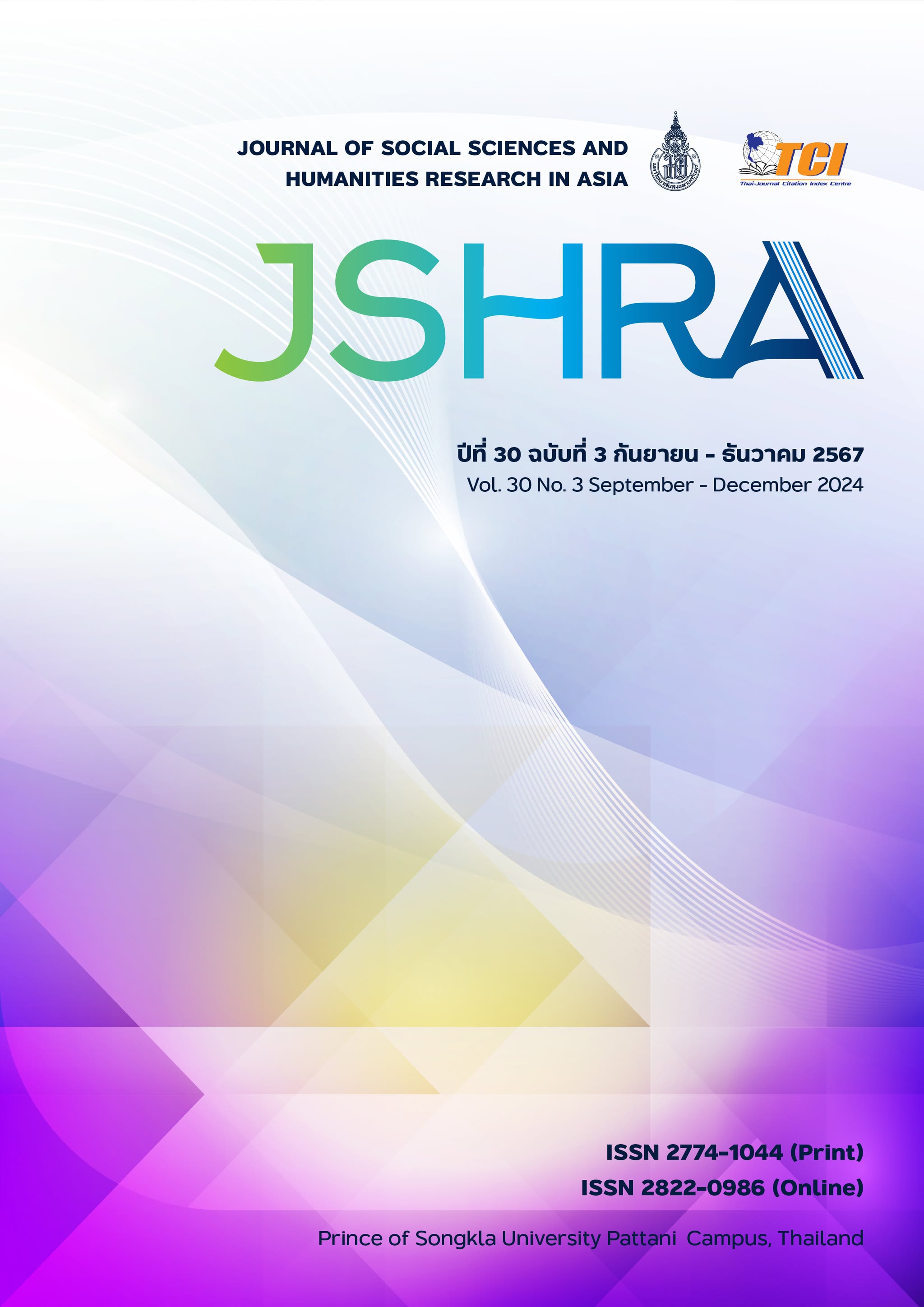The Concept of Human Are Heaven (In Nae Ch'on) And Ethical Ideology: An Analysis of the Teachings of Donghak and Chondogyo
Keywords:
Ch’ondogyo, Ethics Humans are Heaven, Korean New Religion, TonghakAbstract
This study explores the origins and evolution of the concept of Man is Heaven (in nae ch'on, 人乃天) and the ethical ideology of Donghak and Cheondogyo, a new religious movement that emerged in Korea under the leadership of Ch’oe Che-u in the mid-19th century. The findings indicate that the early conception of Man is Heaven was closely intertwined with philosophical and religious discourses on human nature, particularly the innate potential for self-cultivation, a view shaped by the influence of Buddhism and Neo-Confucianism on the Korean Peninsula. Over time, under the stewardship of Ch'oe Si-hyong and Son Byong-hi, the second-and third-generation leaders, this concept was further refined and adapted as a foundational principle for an ethical ideology aimed at guiding human conduct within society. The study concludes that the doctrinal developments within Donghak and Cheondogyo represent a response to the socio-cultural conditions of the time, marked by the expansion of religion’s role, purpose, and scope. This transformation reflects a unique identity for Donghak and Cheondogyo, positioning them as distinct from the established traditions of major religious systems on the Korean Peninsula.and expanding the meaning of religion which is an important identity of the Donghak and Chondogyo and the new religions in Korea, which are significantly different from the traditions of the main traditional religions on the Korean Peninsula.
References
Back, Y., & Ivanhoe, J. P. (2017). Traditional Korean: Philosophy problem and debates. New York: Rowman & Littlefield.
Baker, L. D. (2015). Examining Tonghak: the first organized indigenous religion in Korea. Harvard Journal of Asiatic Studies, 75(2), 427-440. https://doi.org/10.1353/jas.2015.0029
Beirne, P. (2021). Su-un and His world of symbols: The founder of Korea's first indigenous religion. London: Routledge.
Brown, B. E. (1991). The Buddha nature : A study of the Tathagagarbha and Alayavijnana. Delhi: Montial Banarsidass Publishers.
Ch’oe Che U. (2007). Chondogyo scripture, Donggyeong Daejeon (Great Scripture of Eastern Learning) (Y. C. Kim, S. S. Yoon, & C. H. q. o. Chondogyo, Trans.). University Press of America.
Chondogyo, C. H. O. (1997). Ch’ongdo kyongjon ( Ch’ongdogyo Scripture). Ch’ongdogyo chunggang ch’ongbu ch’ulp’anbu.
Chong, K. R. (1969). The Tonghak rebellion: Harbinger of Korean nationalism. Journal of Korean Studies (1969-1971), 1(1), 73–88. http://www.jstor.org/stable/23849478
Eliade, M. (2020). Shamanism: Archaic techniques of ecstasy (R. W. Trask, Trans.). New Jersey: Princeton University Press.
Jae, O. I. (1994). Dong-gwi Il-che [All people evolve towards unity]. In M.-h. Ko (Ed.), Donghak Heokmyeong 100 Junyeon Ginyeom Non Jong [Collection of treatises on the hundredth anniversary of the tonghak Rebillion] (Vol. 1, pp. 269-270). Taekwang Munhwasa.
Jensiripon, N., & Dabphet, S. (2021). Taiping - Donghak: Ideologies for the popular movements in the last dynasties of China and Korea. Thai Journal of East Asian Studies, 25(2), 52-69. https://so02.tci-thaijo.org/index.php/easttu/article/view/247385
Kallander, G. L. (2013). Salvation throufh dissent: Tonghak heterodoxy and Early modern Korea. University of Hawaii Press.
Kim, C. Y. (2007). Important terms and idea of Chondogyo. (S. S. Yoon, Trans.). Maryland: University Press of America.
Kim, H. (2015). The introduction and developement of confucianism in Korea. In S.-s. Youn (Ed.), Korean philosophy: Source and interpretations. Seoul: Korea University Press.
Kim, H. (2017). The Li-Qi structure of the four Beginings and the seven emotions and the aim of the four-seven debate. In Y. Back & J. P. Ivanhoe (Eds.), Traditional Korean Philosophy:
Problems and Debates. New York: Rowman & Littlefield.
Kim, M. Y. (2015). Northern learning and a new view of the world (S. Yoo-taek, Trans.). In Y. Sa-Soon (Ed.), Korean [hilosophy: Source and interpretation. Seoul: Korean University Press.
Kim, Y. (2022). Re-examination of the religious identity of Tonghak. Journal of Korean Religions, 13(1), 5-27. https://doi.org/10.1353/jkr.2022.0000
Kim, Y. C. (1972). The Ch’ondogyo concept of the origin of man. Philosophy East and West, 22(4), 373–384. https://doi.org/10.2307/1397880
Kim, Y. T. (2014). Glocal History of Korean Buddhism. Seoul: Dongguk University Press.
King, S. B. (1992). Buddha nature. Dehli: Sri Satguru.
Lee, Y.-h. (2004). The peasant War in 1984 and the growth of the peasant soceity. In N. T. Don (Ed.), Korean History: Discovery of its characteristic and developments. New Jersey: Hollym International Group.
Lieu, V. J. (2016). The nation,the people and the possibilities of the post-national : Historiographies of late nineteeth century Korean reform movement. In J. M. Seth (Ed.), Routledge Handbook of Modern Korean Hisrory (pp. 43-61). New York: Routledge.
Limpanusorn, P. (1981). Chu Shi’s philosophy of man (Master of Arts). Chulalongkorn University., Bangkok.
MacDonal, P.L. (2009). Human equality movement of Tonghak in late Joseon dynasty (1860 - 1900) Wonkwang University. Iksan.
Min, K. B. (2005). A History of Christian Churches in Korea. Seoul: Yonsei University Press.
Noh, J.-S. (1984). Violence and nonviloence in Minjung’s struggle for justice in the Tonghak revolution. New York: Author.
Paul, B. (2009). Su-un and His world of symbol : The founder of Korea’s first Indigneous religion. Burlington: Author.
Promta, S. (2003). Zen Buddhism: Analytical studies. Bangkok: Chulalongkorn University Press.
Wichit, C. (2022). The concept of God and Buddhist religious pluralism. In S. Satha-Anand (Ed.), Buddhist pluralism (Vol. 1, pp. 154-211). TSRI-Senior Research Fellowship, Kobfai Publishing Project.
Yi, S.-k. (1969). The Korean History. Seoul: Eulyoomoonwhasa.
Youn, S.-s. (2015). Korean Philosophy: Sources and interpretations. Seoul: Korean University Press.
Young, F. C. (2014). Eastern learning and the heavenly way. Honolulu: University of Hawaii Press.










